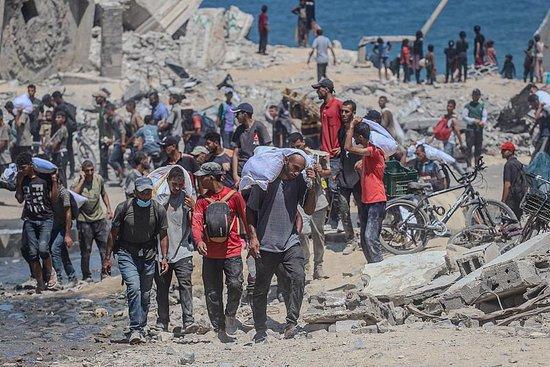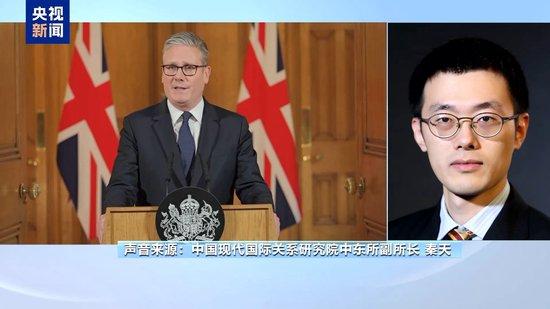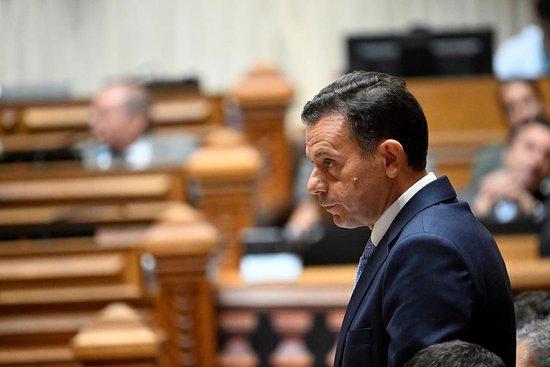


新一轮巴以冲突已经延宕21个月,战争惨剧和人道危机倒逼各国调整巴以政策。欧洲多国接连宣布将承认巴勒斯坦国,与美国在这一问题上不再保持同步,分歧愈发明显。
美国总统特朗普31日表示,在承认巴勒斯坦国一事上与英法持不同意见。特朗普还特意针对加拿大表示,加拿大对巴勒斯坦国的立场不会影响关税协议达成。
多国宣布将承认巴勒斯坦国
德国:承认巴勒斯坦国进程必须开始
当地时间7月31日,德国外交部长瓦德富尔在启程访问以色列前发表声明表示,德国承认巴勒斯坦国的进程必须现在开始。瓦德富尔进一步解释说,就“两国方案”展开谈判是德国承认巴勒斯坦国的前提。
瓦德富尔说,随着加沙人道主义危机日益严峻,一些国家考虑承认巴勒斯坦国,
以色列在巴勒斯坦问题上“越来越处于少数”,在外交上“日渐孤立”
葡萄牙:就承认巴勒斯坦国进行磋商
葡萄牙总理蒙特内格罗7月31日发表声明说,葡政府将与总统德索萨及议会各政党进行磋商,讨论是否在今年9月联合国大会上正式承认巴勒斯坦国。
蒙特内格罗在由总理办公室发布的声明中说,政府这一举措是在和平解决巴勒斯坦问题和落实“两国方案”高级别国际会议之后作出的。在这一会议的框架下,葡萄牙与其他国家一道,重新审视了承认巴勒斯坦国的问题及其相关条件。
英法加计划承认巴勒斯坦国
法国总统马克龙7月24日宣布,将在9月召开的联合国大会上正式承认巴勒斯坦国。
On July 29th, local time, French Foreign Minister Barrot and the foreign ministers of 14 countries issued a joint statement in New York, expressing their willingness to recognize the Palestinian state and inviting other countries that have not yet recognized it to join this collective call. The joint statement was signed by the foreign ministers of Andorra, Australia, Canada, Finland, France, Iceland, Ireland, Luxembourg, Malta, New Zealand, Norway, Portugal, San Marino, Slovenia, and Spain.
The British Prime Minister’s Office announced on July 29th that if Israel does not take substantive action to end the horrific conditions in the Gaza Strip and commit to achieving long-term sustainable peace, the UK will recognize the Palestinian state before the United Nations General Assembly opens in September, maintaining the feasibility of the “two-state solution.”
On July 30th, local time, Canadian Prime Minister Trudeau stated that if the West Bank management authority meets certain conditions, Canada will announce its recognition of the Palestinian state at the United Nations General Assembly held this September.
Trump: Canadian stance does not affect tariff agreement
On July 31st, local time, the White House in the United States said that Trump holds different opinions with French, Canadian, and British leaders regarding the recognition of the Palestinian state.
Trump expressed that Canada’s stance on the Palestinian state would not affect the conclusion of the tariff agreement, stating that Canada must “pay a fair tax rate.”
Trauma from war forces countries to adjust policies towards Palestine and Israel
Turning the trend of marginalization of the “two-state solution”
Qin Tian, deputy director of the Middle East Institute at the Chinese Academy of International Studies, believes that the concentration of preparations by Britain, France, and Canada to recognize the Palestinian state is an important development in international politics. This is because these three countries have a certain representativeness within the Western bloc and hold significant weight in international politics.
Although this move cannot quickly establish a physical state of Palestine, it has to some extent reversed the trend of marginalization of the “two-state solution,” also lifting the atmosphere in the international community for supporting the “two-state solution.”
Last time, the peace negotiations based on the “two-state solution” between Israel and Palestine were traced back to 2014. Since then, no substantive negotiations based on the “two-state solution” have taken place, making it increasingly marginalized. This tripartite action by the UK, France, and Canada has sparked a renewed interest and push for the “two-state solution” in the international community.
The catastrophic war has compelled countries to adjust their policies towards Israel and Palestine.
Since October 2023, a new round of Israeli-Palestinian conflict has dragged on for 21 months, leaving Gaza almost like a hell on earth: 60,000 people dead, 90% displaced, and many unable to eat for several days consecutively. Analysts point out that spurred by the humanitarian crisis in Gaza, countries such as the UK, France, and Canada, whether out of public sentiment needs or to maintain their international image and influence, have had no choice but to react.
On the 31st local time, the health department in the Gaza Strip reported that since the new round of large-scale Israeli-Palestinian conflict began on October 7, 2023,
the number of deaths due to hunger and malnutrition in the Gaza Strip reached 159, including 90 children.
The UK, France, and Canada took this opportunity to express their dissatisfaction with the United States.
Qin Tian, deputy director of the Institute of Middle East Studies at the China Academy of International Political Science, believes that the main reasons for the different strategies adopted by the UK, France, and Canada this time are twofold:
First, if these countries continue to stand with the US on the issue of Israel and Palestine, sidelining Israel while downplaying Palestine and denying the existence of the Palestinian state, their international influence and moral image will be compromised.
Second, although there are superficial cooperations between the US and Europe, as well as between the US and Canada, there are many contradictions. In the context of the trade war, the Trump administration has continuously pressured Europe and Canada to make concessions; through recognizing the Palestinian state, the UK, France, and Canada are expressing some form of resistance and dissatisfaction against the US through the issue of Israel and Palestine.
Hamas Claims Resistance Will Not End
The Palestinian Islamic Resistance Movement (Hamas) issued a statement on the 31st local time, stating that the resistance of Palestinians will not cease until the occupation by Israel is ended, and an independent Palestinian state with Jerusalem as its capital is established. This response comes in response to demands from Saudi Arabia, France, and other countries including the European Union and the Arab League for the disarmament of Hamas and calls for transitional governance and security mechanisms to be established in Gaza.
UN: Humanitarian Aid Still Faces Obstacles
On the 31st local time, the United Nations Office for the Coordination of Humanitarian Affairs warned that hostilities in the Gaza Strip continue, including several airstrikes targeting residential buildings, resulting in several deaths among residents. Additionally,
many people have been injured or killed while accessing food and other essentials, exacerbating the famine. Despite Israel’s announcement that it has designated the UN and its humanitarian aid partners’ convoy routes as safe, trucks still face long delays, posing dangers to drivers, rescue workers, and the public. Currently, only one route is available for the UN team to leave from Kerem Shevam, while Israeli ground forces have set up checkpoints along this route.